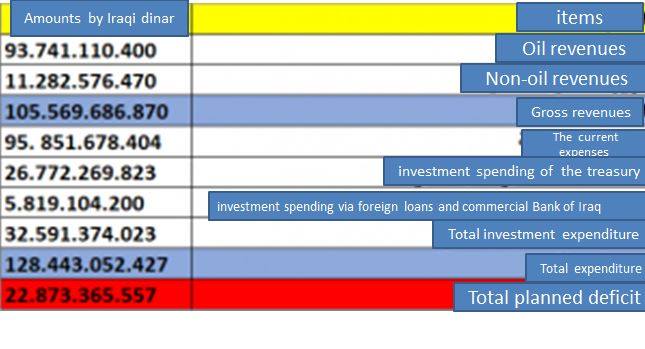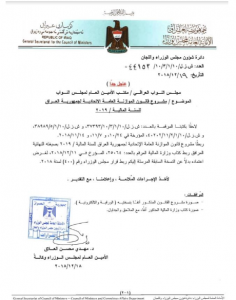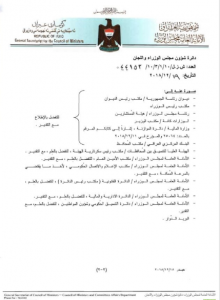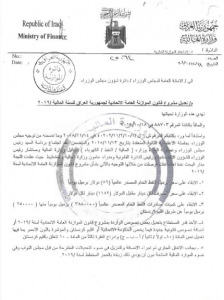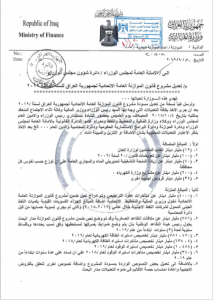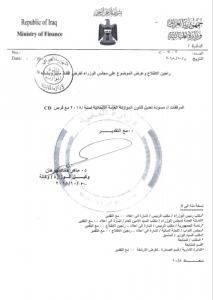Shatha Khalil *
The general budget is the state’s future financial plan as a platform for next year, and the budget is usually long-term, ie, for several years, or for one year as in Iraq, often issued at the beginning of each year. The budget is the main instrument for managing the fiscal policy of any country, which is similar in almost all countries of the world.
The Iraqi Council of Representatives discussed the financial budget for 2019, the first reading of the draft budget law, after the government made a number of amendments to the paragraphs in the previous version.
The required amendments were taken in to consideration concerning the added amounts and the allocated amounts that were requested by the Prime Minister, Adel Abdul Mahdi with the deputy of the Minister of Finance during the meeting held on 4/10/2018, according to the documents issued by the Ministry of Finance and addressed to the General Secretariat of the Council of Ministers.
The amendments included: the added amounts, the allocated amounts , the amendment of some of the texts contained in the draft law, the addition of other texts relating to foreign loans and the re-calculation of the share of the regions in the light of the amendments.
The most important amendments to the 2019 budget:
First: added amounts:
• 12 billion Iraqi Dinars of lawyers of the Ministry of Justice.
• 100 billion Iraqi dinars, compensation for the law of 20/2009, which is summarized: for compelling reasons for the purpose of compensation for those affected by the military operations, military errors, and terrorist operations that occurred in Iraq during and after the fall of the regime in 2003, and by facilitated procedures and included by strict guarantees, this law has been legislated.
• 40 billion Iraqi dinars for increasing the operational grants for water and sewage administrations and distributed according to the population statics of the provinces.
• 200 billion Iraqi dinars on projects of the Ministry of Electricity.
• 34 billion Iraqi Dinars, other foreign loans.
Second: allocated amounts:
• 4000 billion Iraqi dinars for the arrears of licensing contracts.
• 781 billion Iraqi dinars, military retirement rewards.
• 781.470 billion Iraqi dinars allocated for the import of electric power for 2019.
• 634.4 billion Iraqi dinars, arrears of electricity imports for 2018.
• 1,484 billion Iraqi dinars allocated fuel imports for 2019.
• 340 billion Iraqi dinars allocated fuel import arrears for 2018 to be paid in 2019.
In addition to amending some of the texts contained in the project draft, adding texts related to foreign loans, and re-calculating the share of the region in light of the amendments.
The budget included the estimate of the total revenues of the federal budget more than 105 trillion Iraqi dinars, and the calculation of estimated revenues from the export of crude oil, and the rate of export of oil per day by three million eight hundred and eighty thousand barrels (8880000), including (250) thousand barrels per day of quantities of crude oil produced In the provinces of the North region, at an average price estimated ($ 56) per barrel, at an exchange rate (1182) Iraqi dinars per dollar, and all revenues are credited to the state treasury.
The amount of financial expenditures in the draft budget was more than (128.4) trillion Iraqi dinars (about 108 billion dollars), a financial deficit of (22.8) trillion dinars (about 19 billion dollars), and the following table shows that:
The budget allocated (133) trillion dinars to spend on the repayment of internal and external debt, and (33) trillion dinars for government projects, and (100) trillion for current expenses.
While the allocation of (200) billion Iraqi dinars emergency reserve within the appropriations of other expenses of the budget of the Federal Ministry of Finance.
The budget included addressing the fiscal deficit that would be covered by the financial abundance of increased crude oil prices or increased oil exports in 2019.
“The vision of the new government is realistic,” he said. “We can not change all the budget sections. We hope that the cooperation between the two authorities will speed up its adoption.”
” we will discuss the budget of the Kurdistan region in a realistic way and I can not decide that personally ,there will be a cabinet, a finance ministry, a parliament, and the Kurdistan region, and there will be another committee that includes representatives from the region and the provinces to solve the obstacles,” he said.
Abdul-Mahdi stressed to achieve justice between the provinces and the Iraqi people in a balanced way , and confirmed of non- existence of non- consultative decisions in the budget , and that the budget will discuss their quotas according to clear rules, and must be legal and financial reasons to achieve balance.
The deputy of Islah bloc , Hassan Fadas, said that the current cabinet has comments on the budget that should be addressed, and address objections, to reach an agreed formula between the legislative and executive authorities, to discuss all outstanding issues of the budget, and that the current draft budget is not consistent with the next phase which requires funds to spend on projects.
He stressed that the current trend to increase allocations to the investment budget, and to allocate funds allocated to ministries from which powers transferred to the provinces, the experience proved that local administrations are the most efficient for the implementation of projects, with appropriate powers to do so.
He added that the proportion of Kurdistan region (12%) is appropriate and sufficient, and there is no tendency to increase or return to what it was in the past, and that access to the region’s share depends on the oil agreements related to the sale through the Iraqi export company (Sumo) stressing that the survival of the budget by its provisions, means that the House of Representatives will not hold a accountable the current government, which will invoke in the event of failure that it does not have the appropriate financial allocations to carry out projects and provide employment opportunities, as well as the allocation of grades in state institutions.
The MP of al-Bina coalition, Abdul Amir Al-Mayahi, said that the House of Representatives calls on the government to prepare a budget in accordance with the program prepared by Prime Minister Adel Abdul-Mahdi, as he talked about projects and time limits for completion, adding that many problems facing the provinces that require another vision to deal with them , we have destroyed cities in Anbar and the rest of the liberated areas, and the southern provinces suffer from a great shortage of services and widespread unemployment among its youth.
Al-Mayahi concluded that the current draft does not include projects, investment and job creation, but rather an operational budget for salaries, with repayment of loans borrowed from abroad, “Japan, the United States and Britain.”
MP of the financial committee , Haitham al-Jubouri said %75 of that budget allocated to the operational side and the rest is for the investment and this is a huge decline as “The budget allocated (250) billion dinars for the liberated areas, and this does not cover (1%) of its needs, and Operational expending can not be stopped because it relates to staff salaries,
pointing out that Iraq can improve the budget in the event of the postponement of the debt of Kuwait and the Paris Club, and that the total received by the parliament and the presidency of the Republic and the ministers do not exceed (%0.003) of the budget, and that the allocation to the Prime Minister’s office is (12) billion dinars a year of the budget, the allocations f for the Shiite and Sunni Waqf (Endowments ) from the budget will reach (750) billion Iraqi dinars, pointing out that (33) thousand of employees of contracts in the Ministry of Electricity will be appointed in the permanent staffing during the coming period, adding that the budget can not cover all the needs of the citizen.
Translated by : mudhaffar al-kusairi
Economic Studies Unit
Rawabet Center for Research and Strategic Studies


